
Evolution, it's nature's way of subtly changing things so the next generation will continue to survive and thrive. But it's not just nature that changes things for the better, it's how we all live, learn, and change things around us for the better.
The engineers over at Google are constantly trying to improve and evolve their search engine algorithm to better understand what information is being published online and how that information will be used. Sometimes the information we publish in hopes of targeting one audience yields a completely different result.
Through the evolution of the internet, Google has learned a lot more about how people search and what information will best match the search queries they are using. You see, Google collects the search queries that we all use, and they monitor what we click on. They also monitor if we click the browser back button and choose a different selection from the SERP. It's those secondary choices that help Google understand how the phrases we search for best relate to the results we really want.
Knowing how all the queries and content fit together helps Google provide better answers for other people when they search for the same phrases. According to this article from May 2013, 15% of the queries submitted to Google every day are unique--which means they have experience with the other 85%.
If you had to answer the same questions over and over again 85% of the time every day, don't you think you'd become very efficient at providing answers? Of course you would.
As it turns out, every question has an underlying reason for asking. We call it the "search intent." Sometimes the user doesn't explain why they are asking a specific question, and yet Google seemingly reads their mind to provide an unexpectedly accurate answer.
If you specifically search Google using the date range of 1998-2000, you'll find a bunch of scientific reports explaining how people were using early search engines. It's from these university papers that the concepts of navigational, informational, commercial, and transactional search intent came from.
Navigational - searches for a name or a website address when you can't remember what the real URL is
Informational - searches for information that is needed right then and there
Commercial - searches for broad range of products, services, or expertise that might lead to a future sale
Transactional - search for specific products or specific services in a specific location.
Understanding these four search intent types doesn't come easy, and is best illustrated through examples. Google understands them better than anyone because they have the hindsight of many years of data.
Here are examples to help you understand what these search intent types are and how they relate to the content on your website.
Navigational Search Intent
I'm often asked why, when looking at reports from Google Webmaster Tools, the keyword phrases including the store name are always have the highest impressions. I simply like to think of this as your existing customers trying to get back to your website. On the other hand, it could also be people who saw your billboard, or even your newspaper ad. Simply put, they are searching for your website by directly searching for your store name.
Here's a simple example using my demo jewelry store account. These are the results I see when I search for "Perosi Jewelers:"
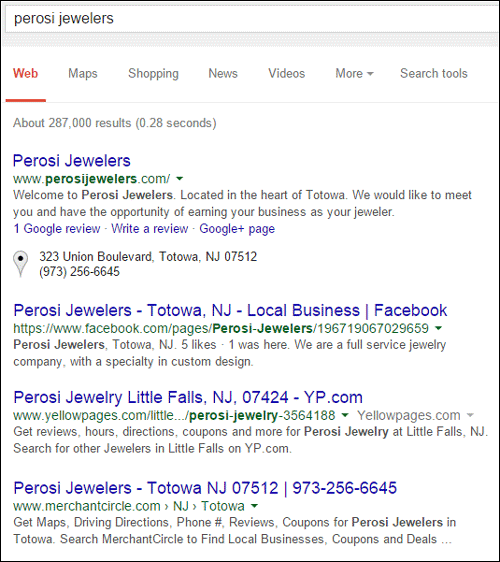
The hope is that the people searching for your name will purchase online or visit your store directly. I usually find that people using navigational searches will exit the website once they reach the store hours, contact, or some product page. Without more detailed tracking, there's no way to measure if they ever arrive in the store.
Informational Search Intent
Smartphones now give us the freedom to search for anything from anywhere. Any casual conversation can be quickly enriched by rapid search results on any topic, especially trending ones.
The trending topics, as I write this, include the 2015 Grammy Awards from this past Sunday night. A quick search for "jewelry worn at the grammys" yields these results:
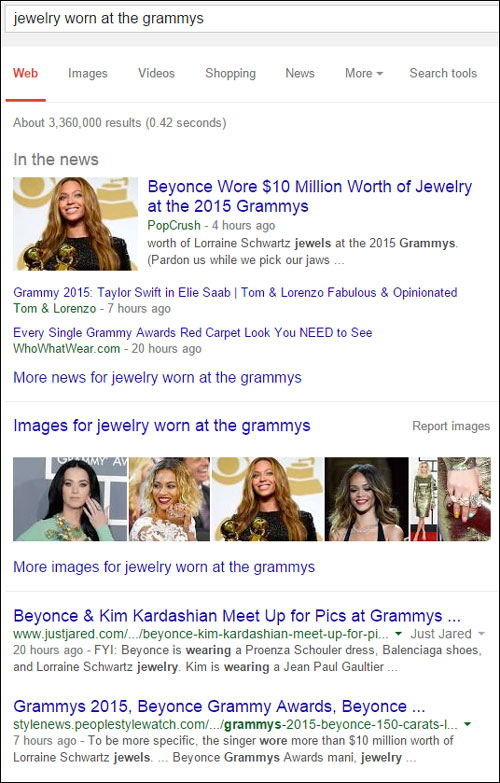
While these informational search types help enhance some other personal experience, as a business owner you are hoping that it will also lead to a sale of some type. This is where your content marketing strategies fit in, because the more content you build for your site, the better your chances to appear in a random informational search like this.
Every month, I measure several people searching for the phrase "birthstone of the month." Google knows that most of the time this is just an informational search, and so the SERP showed me these qualified referrals for birthstones:
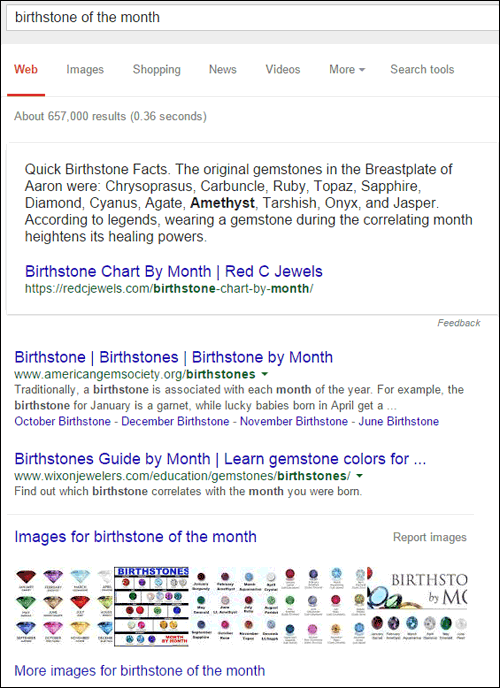
The top of that SERP shows an information "card" with quick birthstone facts. I have to congratulate the referral website for that fact card, redcjewels.com. It's incredibly difficult to achieve such high recognition as an informational source directly in Google SERPs. I would have expected AGS to be cited as the credible source, but they are second in the results.
I also have to give a shoutout to Wixon Jewelers that you see third in the above list. I reviewed their website here and then wrote about their Small Business of the Year award here. Every jeweler should be modeling their own online and business practices after Wixon's lead.
Commercial Search Intent
Commercial and Informational search intent are closely related cousins. While informational searches are usually performed for immediate gratification, the commercial search represents the initial phases of research that lead towards the inevitable business transaction.
Someone searching for "classic engagement rings" could be starting their engagement ring research or they could be looking for a place to buy that style ring. Google understands that this particular search could be either informational or it could lead to a sale, which means it would be a transactional type. But since Google isn't sure, they will return a hybrid result like you see here:
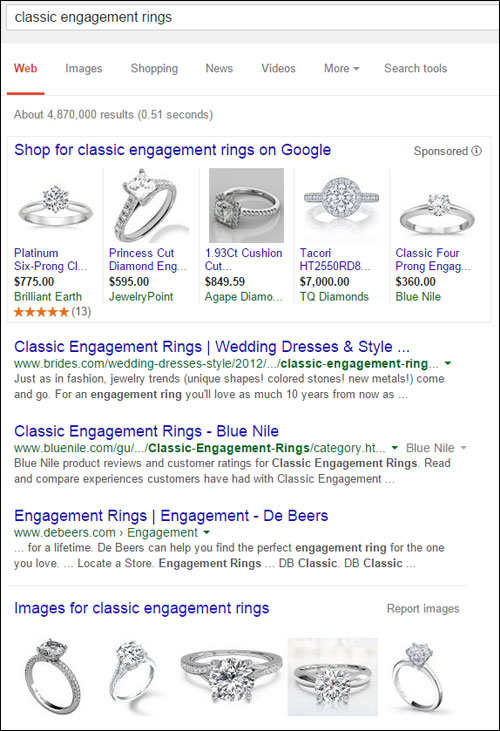
In those results, you'll notice 5 products across the top, followed by an article from Brides Magazine, then potential sales pages from BlueNile and DeBeers, and then a smattering of images. Google won't know exactly what you're looking for until you click around a little more and establish other recognizable search behavior patterns.
It's very difficult to identify a search query that falls into the "commercial search intent." This category also includes competitive research and even when you, as a jeweler, are looking for a new watch repair service to send your watches to.
Suffice it to say, you can identify commercial search intent results when the SERP includes blogs for education and products/services for sale.
Transactional Search Intent
Search queries will take on a very specific format when it's time to make a purchase decision. They usually include location based queries for products and services, and they are usually long tail search phrases.
The search for "diamond engagement rings" only includes results where someone can purchase a ring. As seen here:
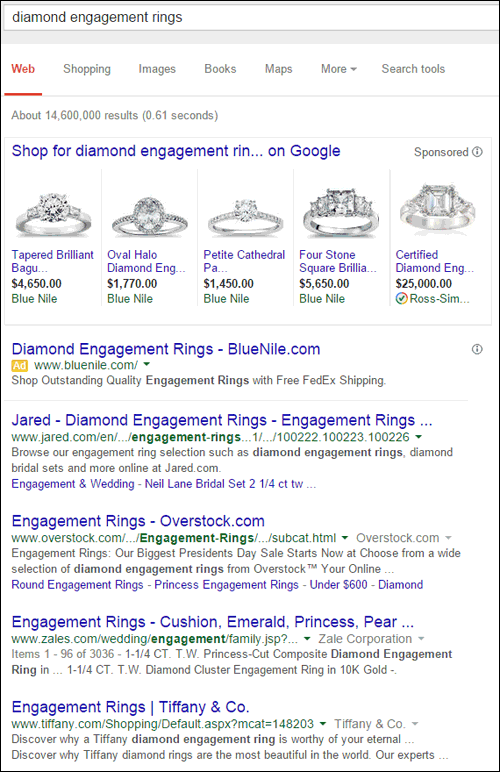
When it comes to products and services, all those informational and commercial searches eventually lead to this type. Informational searches might only have 1 or 2 words in the search query, and then commercial search phrase have 1 or 2 more. By the time someone reaches their purchase decision, they know exactly what very long search query to use in order to zero in on their intended result.
Putting Search Intent to Use
Now that you've learned a little bit about the 4 search intent types, it's time to put them to good use in your content building.
Download your recent Search Query list from Google Webmaster Tools and run your own searches for every phrase on that report. Make sure to use incognito mode when you do these searches. Try to figure out which search intent type the SERP is showing you, because that will tell you the information you need to add to your website.
For example, any search phrase including a celebrity name, like "victoria beckham engagement ring," will certainly be an informational search. You would need to publish more information about Victoria Beckham on your website if want to capture more traffic for that phrase.
On the other hand, if you see a long phrase like "december birthstone engagement rings," then you need to write longer descriptions for all the Blue Topaz rings in your online product catalog. Those fleshed out descriptions will help Google match your jewelry catalog to those specific transactional searches.
Analyzing website content to this degree certainly is time consuming, but it will help you understand if the content you are creating will actually attract the customers you're looking for, and for the right reasons. After all, when your resources are limited you always need to make sure what you publish will target the correct audience.








